
If buyers are not able to meet the lending criteria for a traditional mortgage, an owner-financed mortgage could be a great option. This arrangement allows homebuyers lower down payments and saves them from the tedious process of applying to for a conventional mortgage.
While there are many benefits to this form of financing, there are also some drawbacks. The biggest drawbacks include high interest rates, balloon repayments, and a lack in transparency. Before you sign on to this type of financing, do your research.
Benefits of owner financing
The purchase of a home can be one of your biggest financial decisions. It is an investment in your future and you want to make sure it is right for you. That's why it's important to shop around and find the best loan option for you.

A mortgage might be the most popular type of home loan, but it's not for everyone. Some borrowers may not be eligible for conventional loans due their credit score, income level, or because they don't possess enough money to cover a downpayment.
Some people choose to owner finance their home purchases in order to get a better rate on a loan, and it is possible for owner-financed homeowners to refinance into a traditional mortgage at some point in the future. The owner-financed mortgage option is not permanent and should be discussed with a professional.
Can an owner finance a mortgage on their home?
A buyer may be able to finance their home purchase using a mortgage. However, the seller must agree to the terms. They will need to sign a contract that details the financing agreement and how it will work.
In this type of sale, the seller will put a portion of the purchase price towards the loan, and the buyer will make monthly payments to cover the remaining balance. Taxes, insurance, and other fees related to the mortgage will be paid by the seller.

A buyer may not have the funds to make a downpayment or the seller wants to sell the house as quickly as possible to earn as much cash. This option is often less expensive than a traditional mortgage. If you don’t have the funds to purchase the home, it might be worth looking into this alternative.
The key to success with owner financing is establishing a good relationship with the seller. It is essential to establish good relationships with the seller. If the title is unclear, it could result in costly legal issues in the future. Before signing a contract for an owner financed mortgage, it is a smart idea to verify the seller's employment and credit history.
FAQ
What are the benefits of a fixed-rate mortgage?
With a fixed-rate mortgage, you lock in the interest rate for the life of the loan. This will ensure that there are no rising interest rates. Fixed-rate loans come with lower payments as they are locked in for a specified term.
How many times can my mortgage be refinanced?
It all depends on whether your mortgage broker or another lender is involved in the refinance. In both cases, you can usually refinance every five years.
What are the disadvantages of a fixed-rate mortgage?
Fixed-rate mortgages tend to have higher initial costs than adjustable rate mortgages. You may also lose a lot if your house is sold before the term ends.
What are the chances of me getting a second mortgage.
Yes. But it's wise to talk to a professional before making a decision about whether or not you want one. A second mortgage is often used to consolidate existing loans or to finance home improvement projects.
Statistics
- The FHA sets its desirable debt-to-income ratio at 43%. (fortunebuilders.com)
- Based on your credit scores and other financial details, your lender offers you a 3.5% interest rate on loan. (investopedia.com)
- Private mortgage insurance may be required for conventional loans when the borrower puts less than 20% down.4 FHA loans are mortgage loans issued by private lenders and backed by the federal government. (investopedia.com)
- It's possible to get approved for an FHA loan with a credit score as low as 580 and a down payment of 3.5% or a credit score as low as 500 and a 10% down payment.5 Specialty mortgage loans are loans that don't fit into the conventional or FHA loan categories. (investopedia.com)
- Some experts hypothesize that rates will hit five percent by the second half of 2018, but there has been no official confirmation one way or the other. (fortunebuilders.com)
External Links
How To
How to Manage A Rental Property
You can rent out your home to make extra cash, but you need to be careful. This article will help you decide whether you want to rent your house and provide tips for managing a rental property.
Here's how to rent your home.
-
What factors should I first consider? You need to assess your finances before renting out your home. If you have outstanding debts like credit card bills or mortgage payment, you may find it difficult to pay someone else to stay in your home while that you're gone. It is also important to review your budget. If you don't have enough money for your monthly expenses (rental, utilities, and insurance), it may be worth looking into your options. It may not be worth it.
-
How much does it cost for me to rent my house? There are many factors that influence the price you might charge for renting out your home. These factors include your location, the size of your home, its condition, and the season. Keep in mind that prices will vary depending upon where you live. So don't expect to find the same price everywhere. Rightmove reports that the average monthly market price to rent a one-bedroom flat is around PS1,400. This means that if you rent out your entire home, you'd earn around PS2,800 a year. Although this is quite a high income, you can probably make a lot more if you rent out a smaller portion of your home.
-
Is it worth it? Although there are always risks involved in doing something new, if you can make extra money, why not? Before you sign anything, though, make sure you understand exactly what you're getting yourself into. Not only will you be spending more time away than your family, but you will also have to maintain the property, pay for repairs and keep it clean. These are important issues to consider before you sign up.
-
Is there any benefit? So now that you know how much it costs to rent out your home and you're confident that it's worth it, you'll need to think about the advantages. You have many options to rent your house: you can pay off debt, invest in vacations, save for rainy days, or simply relax from the hustle and bustle of your daily life. You will likely find it more enjoyable than working every day. If you plan ahead, rent could be your full-time job.
-
How do I find tenants After you have made the decision to rent your property out, you need to market it properly. Make sure to list your property online via websites such as Rightmove. You will need to interview potential tenants once they contact you. This will help you assess their suitability and ensure they're financially stable enough to move into your home.
-
What can I do to make sure my home is protected? If you don't want to leave your home empty, make sure that you have insurance against fire, theft and damage. You will need to insure the home through your landlord, or directly with an insurer. Your landlord will typically require you to add them in as additional insured. This covers damages to your property that occur while you aren't there. If you are not registered with UK insurers or if your landlord lives abroad, however, this does not apply. You will need to register with an International Insurer in this instance.
-
It's easy to feel that you don't have the time or money to look for tenants. This is especially true if you work from home. However, it is important that you advertise your property in the best way possible. It is important to create a professional website and place ads online. Additionally, you'll need to fill out an application and provide references. While some people prefer to handle everything themselves, others hire agents who can take care of most of the legwork. You'll need to be ready to answer questions during interviews.
-
What should I do after I have found my tenant? If you have a contract in place, you must inform your tenant of any changes. You can negotiate details such as the deposit and length of stay. While you might get paid when the tenancy is over, utilities are still a cost that must be paid.
-
How do I collect the rent? When it comes time for you to collect your rent, check to see if the tenant has paid. You'll need remind them about their obligations if they have not. Before you send them a final invoice, you can deduct any outstanding rent payments. If you're having difficulty getting hold of your tenant you can always call police. If there is a breach of contract they won't usually evict the tenant, but they can issue an arrest warrant.
-
How do I avoid problems? It can be very lucrative to rent out your home, but it is important to protect yourself. Install smoke alarms, carbon monoxide detectors, and security cameras. It is important to check that your neighbors allow you leave your property unlocked at nights and that you have sufficient insurance. You must also make sure that strangers are not allowed to enter your house, even when they claim they're moving in the next door.